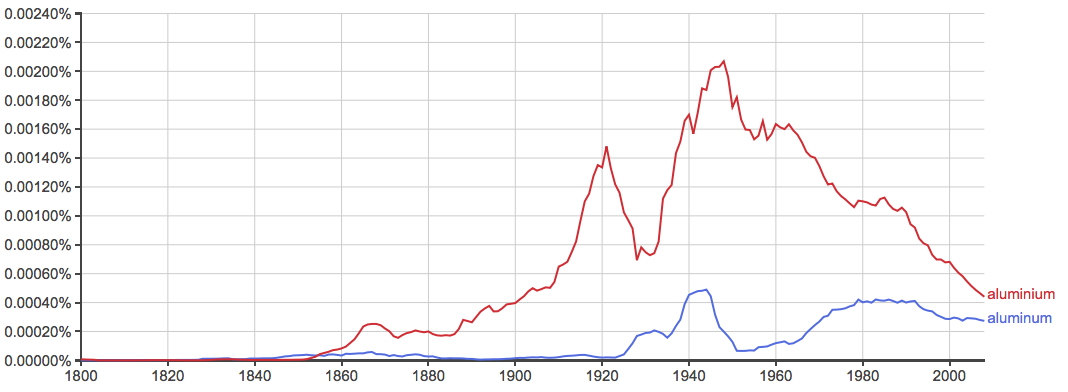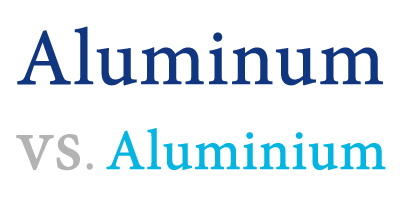The periodic table has a name for every element, and English has at least one word that corresponds to each name. In the case of the element with the symbol Al and the chemical number 13, English has two words: aluminum and aluminium.
The difference between these two words comes down to the differences between American and British English. While aluminum is the original word, British editors standardized around aluminium, to preserve consistency with elements like sodium, lithium, and titanium.
Continue reading to find out when to use each version of this word.
What is the Difference Between Aluminum and Aluminium?
In this article, I will explore the aluminum vs. aluminium debate. I will use the words in example sentences to illustrate how they should look in context. I will subsequently show you a mnemonic device for your mental toolkit that will help you remember whether to use aluminum or aluminium.
When to Use Aluminum
 What does aluminum mean? The word aluminum is a noun. Aluminum is a type of metal that is useful in a variety of applications because it is lightweight, resistant to corrosion, and excellent at conducting heat.
What does aluminum mean? The word aluminum is a noun. Aluminum is a type of metal that is useful in a variety of applications because it is lightweight, resistant to corrosion, and excellent at conducting heat.
Here are some examples of aluminum in sentences,
- Aluminum conducts electricity but not as well as silver, copper, or gold.
- Kyle used aluminum baseball bats when he was young, but as he grew older, he switched to bats hewn of ash.
- My cookware has a layer of aluminum bonded between layers of stainless steel, so that food heats more evenly.
- One of the world’s largest aluminum stockpiles, which until a few months ago was stored under hay and plastic tarp in a Mexican desert, has been moved to a remote port here in southern Vietnam. –The Wall Street Journal
When to Use Aluminium
What does aluminium mean? Aluminium is the British English word for the same metal. The following chart compares usage of aluminium vs. aluminum in British English works published since 1800,

As you can see, the British have historically preferred the spelling aluminium, and it predominates there to this day. Interestingly enough, however, the gap between the two might be narrowing. That said, this chart isn’t exhaustive in its scope, only looking at books, to the exclusion of papers, magazines, journals, etc. Still, it is helpful in determining long-term usage trends.
These sentences illustrate the British English aluminium,
- “Bloody hell, Commerford, stop using that silly Italian pot; the coffee tastes like aluminium!” said Wilshire.
- “Is the tap made of aluminium, or stainless steel?” asked Bronwyn.
- Velar is based on the same fundamental aluminium components as its sister car, as is common in the industry these days; just one of the revolutions the TT kicked-off nearly 20 years ago. –The Telegraph
Trick to Remember the Difference
 You can easily decide whether to choose aluminum or aluminium by keeping your audience in mind.
You can easily decide whether to choose aluminum or aluminium by keeping your audience in mind.
American readers are used to aluminum, while British audiences prefer aluminium. While aluminum was the original spelling of the element, many scientific communities have standardized around aluminium, so if you are writing for a scientific journal, that might be your best choice.
For everyday writing, however, if you have trouble remembering that aluminium is the British version of this word, remember that aluminium has two I’s, much like the word British.
Summary
Is it aluminum or aluminium? Aluminum and aluminium both describe an elemental metal that makes up roughly 8% of the earth’s crust, and is used by humans for many things.
- Aluminum is the American version of the word.
- Aluminium is the British version.
Since aluminium and British are each spelled with two I’s, you can easily remember that aluminium should be reserved for British audiences.
If you require additional assistance, be sure to check this article for a quick refresher when choosing aluminium or aluminum.
Contents
